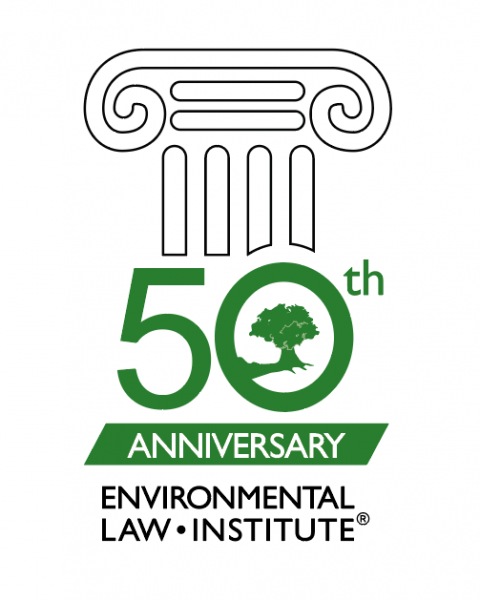(Washington, D.C.): Our air, water, and lands are much cleaner and healthier than they were on April 20, 1970, the first nationwide celebration of Earth Day (organized with the help of original ELI Board Member Sydney Howe). But major environmental challenges, including climate change, continue to this day.
 Throughout the month of April, ELI will be taking a closer look at “The Role of Law in Climate Response and Energy Transformation” as we continue to offer special events, programs, and publications in commemoration of our 50th Anniversary.
Throughout the month of April, ELI will be taking a closer look at “The Role of Law in Climate Response and Energy Transformation” as we continue to offer special events, programs, and publications in commemoration of our 50th Anniversary.
The March/April issue of ELI’s policy journal, The Environmental Forum, features a “Debate in Print” that concentrates on the U.S. energy system. In it, several prominent experts were asked: How should public policy move forward to promote the decarbonization of the American economy? And what blend of law, economics, science, and technology will get the job done?
Relatedly, just last month, ELI Press released Legal Pathways to Deep Decarbonization in the United States, a “legal playbook” for deep decarbonization in the United States, identifying well over 1,000 legal options for enabling the United States to address climate change. Edited by leading climate law experts Michael B. Gerrard and John C. Dernbach, the book addresses in detail 35 different topics in as many chapters, including energy efficiency, conservation, and fuel switching; electricity decarbonization; fuel decarbonization; carbon capture and negative emissions; non-carbon dioxide climate pollutants; and a variety of cross-cutting issues. On April 25, ELI will host An Action Agenda for Legal Pathways to Deep Decarbonization in the United States, where the editors and some of the contributing authors will offer insight as to recommendations set forth in the book.
Following the adoption of the Paris Climate Agreement, ELI published a Model Law Implementing the Nationally Determined Contributions Submitted Under the Paris Agreement to give countries that were operating without an existing legal framework guidance on how to construct a law-based system for delivering on their Nationally Determined Contributions under the Paris Agreement. ELI released an update on April 1, 2019, to ensure that it continues to represent our best thinking in this area. ELI will continue to update this living document as new developments and considerations arise.
Natural gas is a growing source of energy, yet it is an area fraught with varying stakeholder concerns, energy requirements, and infrastructure needs. On April 4, ELI will hold a master class on Natural Gas & Pipeline Issues to address the legal and technical issues involved with natural gas pipeline expansion projects. On April 8, ELI will host Managing the Future of the Electricity Grid: Energy Storage and Greenhouse Gas Emissions, a webinar featuring Prof. Richard L. Revesz, New York University School of Law, and Dr. Burcin Unel, NYU Institute of Policy Integrity. They propose that state and federal regulators adopt policy reforms that internalize emission externalities, eliminate entry barriers, and modify market rules to guarantee accurate price signals that value the benefits of clean energy storage. And on April 18, a group of leading lawyers and law professors will be discussing the problem of climate change and the role of lawyers in advancing solutions at the Third National Conference of Lawyers Committed to Addressing the Climate Emergency. ELI is pleased to be a co-sponsor for this important event, where U.S. Senator Ed Markey, U.S. Rep. Ted Deutch, and Prof. Michael Mann are scheduled to speak.
And the number of companies voluntarily committing themselves to using more renewable energy is on the rise. In a new report, Corporate Statements About the Use of Renewable Energy: What Does the “100% Renewable” Goal Really Mean?, ELI demystifies the voluntary world of corporate renewable energy claims, taking a detailed look at voluntary corporate renewable energy goal-setting, reporting, and performance.
ELI traces its origins to a national conference on the emerging field of environmental law held at the Airlie House in Virginia in September 1969. Often described as a one-of-a kind environmental law think-and-do tank, ELI continues to effect change through its work as a premier environmental law educator, convener, publisher, and research engine as we enter our 50th year.
Be sure to visit https://www.eli.org/eli-50th-anniversary throughout the year for details and updates.